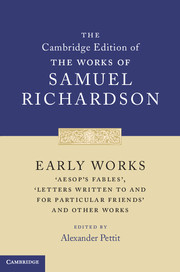Book contents
- Frontmatter
- Dedication
- Contents
- General Editors’ Preface
- Acknowledgements
- Chronology
- List of Abbreviations
- General Introduction
- Textual Introduction
- The Apprentice’s Vade Mecum (1733)
- A Seasonable Examination of the Pleas and Pretensions (1735)
- Preface to Aubin, A Collection of Entertaining Histories and Novels (1739)
- Aesop’s Fables (1739)
- Letters Written to and for Particular Friends (1741)
- Six Original Letters Upon Duelling (1765)
- Appendix: The Infidel Convicted (1731)
- Postscript
- Emendations
- Word-division
- Bibliographical Descriptions of Early Editions
- Explanatory Notes
- Index
Letter XX
Published online by Cambridge University Press: 30 June 2022
- Frontmatter
- Dedication
- Contents
- General Editors’ Preface
- Acknowledgements
- Chronology
- List of Abbreviations
- General Introduction
- Textual Introduction
- The Apprentice’s Vade Mecum (1733)
- A Seasonable Examination of the Pleas and Pretensions (1735)
- Preface to Aubin, A Collection of Entertaining Histories and Novels (1739)
- Aesop’s Fables (1739)
- Letters Written to and for Particular Friends (1741)
- Six Original Letters Upon Duelling (1765)
- Appendix: The Infidel Convicted (1731)
- Postscript
- Emendations
- Word-division
- Bibliographical Descriptions of Early Editions
- Explanatory Notes
- Index
Summary
From the Father, in Answer to the young Gentleman.
Sir, Nottingham, April 16.
I have received yours of the 12th, and am obliged to you for the good Opinion you express of my Daughter. But I think she is yet full young to alter her Condition, and imbark in the Cares of a Family. I cannot but say, that the Account you give of yourself, and your Application to me, rather than first to try to engage the Affections of my Daughter, carry a very honourable Appearance, and such as must be to the Advantage of your Character. As to your Beginning, Sir, that is not to be so much looked upon, as the Improvement; and I doubt not, that you can make good Proof of what you assert on this Occasion. But still I must needs say, that I think, and so does her Mother, that it is too early to incumber her with the Cares of the World; and as I am sure she will do nothing in so important an Affair without our Advice, so I would not, for the world, in a Case so nearly concerning her, and her future Welfare, constrain her in the least. I intend shortly to send for her home; for she has been longer absent from us, than we intended; and then I shall consult her Inclinations; and you will excuse me to say, for she is my Daughter, and a very good Child, tho’ I say it, that I shall then determine myself by that, and by what shall appear to offer most for her Good. In the mean time, Sir, I thank you for the Civility and commendable Openness of yours; and am,
Your humble Servant.
The Father in this Letter referring pretty much to the Daughter's Choice, the young Gentleman cannot but construe it as an Encouragement to him, to prosecute his Addresses to her; in which he doubles his Diligence, (on the Hint, that she will soon return to Nottingham) in order to gain a Footing in her good Will; and she, finding her Father and Mother not averse to the Affair, ventures to give him some room to think his Addresses not indifferent to her; but still altogether on Condition of her Parents Consent and Approbation.
- Type
- Chapter
- Information
- Early Works'Aesop's Fables', 'Letters Written to and for Particular Friends' and Other Works, pp. 356 - 357Publisher: Cambridge University PressPrint publication year: 2011

